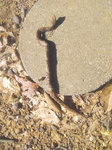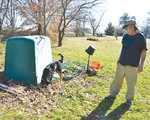


SILER CITY — Professional exterminators have been known to provide valuable services to homeowner and business alike by eliminating pests and vermin ranging from termites to roaches to rats.
And sometimes snakes.
But David Gilmore doesn’t have need of any of the folks you may find in the yellow pages, at least when it comes to getting rid of snakes. He’s got his own built-in resident snake-catcher and so far, this year, that pest control service he calls “Buddy” is building quite a resume.
Buddy is Gilmore’s 15-year old English Shepherd who lives with him at his home near the Chatham-Randolph county line. Over the last few weeks, Buddy has come across at least seven copperhead snakes in Gilmore’s yard and has eliminated them all. For whatever reasons, the wet, cold winter — with some warms days mixed in — and Gilmore’s proximity to nearby woods have created an unusually large number of the creepy, crawly copperheads. Most of them have been in the two- to three-foot range; Gilmore has also seen egg shells where the mother snake has hatched her offspring.
“I always thought copperheads were born alive but there are egg shells all around that stump,” he said.
Part of the reason for the increase, Gilmore thinks, could be that the root stump of a large tree blown down during a storm has served as a home and incubator for the snakes.
“I think they bed in the stump and dirt,” he says. “Lately, I’ve been trying to burn the stump and I guess the heat drives them out if they’re in there.”
Gilmore first noticed the abundance of snakes in the fall.
“I was inside the house one night watching a movie with my girlfriend when we heard Buddy barking and barking,” he says. “I looked out and there was a snake on the front porch.”
Since that night, Buddy’s bark alarm has notified Gilmore of more snakes.
“He sees them or smells them, the musky smell they have,” Gilmore says. “He’ll start barking and make them curl up. Then he waits for me to say ‘Kill it!” and he grabs it and flips the snake up in the air.”
Usually, a snake with such a greeting is dead when it hits the ground, Gilmore says, but Buddy — ever playful — isn’t through with his prey.
“He’ll play with them until he gets tired or I throw it away,” he said. “One reason there have been so many, I think, is because I’ve always heard copperheads are family snakes; where you see one, you’ll see more.”
Copperheads are native to North Carolina, ranging from the northeastern part of the U.S. to as far west as Texas. Copperheads are known to be more likely to bite than other varieties of snakes but usually the venom isn’t strong enough to prove fatal to the average human. More often than not, if left alone and undisturbed, a copperhead won’t attack.
The same can’t be said for Buddy.
Gilmore is a native of the area and part of the family of the same name that’s been in the nursery business in nearby Julian for years. He’s a relative of Tom Gilmore, an unsuccessful candidate for the office of North Carolina governor years ago, who was for years a mainstay of the nursery.
“I’ve lived on this place for 50 years,” he says, “and we’ve always had snakes in the fields and woods. Most of them, like Pilots or black snakes, we leave alone. But Buddy definitely doesn’t like copperheads.”
But just to prove he’s a dog of no prejudice, Buddy will also chase other wildlife – “a lizard or mouse or squirrel,” Gilmore said.
“One night I heard him barking and came out and he was halfway up a tree after a possum. You just never know.”